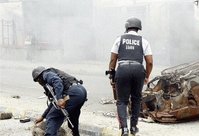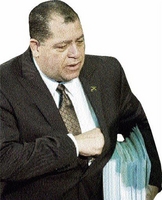Budget blues ... and green
Published: Sunday | May 3, 2009

Ian Boyne
There was no repeat of the '79 and '99 gas riots, despite widespread fears. A couple of protests last week failed to ignite any favourable response from ordinary people, and even if the security forces were not swift to put down the illegal blocking of roads, the protests would very likely have petered out.
The leadership of the People's National Party wisely read the people's mood that there was no resonance to riot; that though people are feeling the hardships and recognise the multiplier effect of the gas tax, they perceive it is not just Prime Minister Bruce Golding's fault or any innate wickedness on his part. The Jamaican people have become politically mature, the media rejoiced, after their worst fears failed to materialise. But there were certain factors which helped in that "maturity".
Not doing enough

A policeman tries to clear a section of Molynes Road that was blocked during a demonstration last Tuesday morning against the Government tax on petrol. - Ian Allen/Staff Photographer
One, despite the fact that the Government itself has not done enough to exploit the global economic crisis as a means of explaining why it can't do more, people have exposure to cable television and especially to relatives and friends abroad, and they have heard that things are "dread" even in the great United States. Deep cultural penetration from America and connections to the US through the diaspora have helped in this instance. It's harder, in some instances, in this age of globalisation to gain traction for your political propaganda.
Mark you, I reject the romantic view that our people are all sophisticated and invulnerable to political propaganda and manipulation. That's just one of those convenient and sacrosanct myths which roll easily from the tongue - the questioning of which incurs thunderous disapproval and howls of "insulting people's intelligence". But in this instance, the information on the global economic crisis has been so pervasive and reinforcing, with urban populations in particular being so bombarded with the information from both traditional media and contacts abroad that it was harder to get away with the "Is Golding Fault" propaganda.
Besides, the strategic release of the information that Government was thinking of putting a tax on gas and the fact that a number of prominent voices and "experts" voiced support for this controversial move served to soften public reaction and make people amenable to the tax.
The framing of the discussion of the gas tax in such a way as to make it a most logical and eminently sensible course influenced the PNP leadership in not taking a too-militant approach. The masses might not be all that impressed with the financial analysts and society bigwigs who speak on talk media and who write newspaper columns, but the Opposition and the interest groups are very much influenced by the chattering classes, and once they see the discussion swinging in a particular direction, they don't usually want to buck the trend.
I was saying to friends worried about gas protests that my gauging of the public discussions suggested that the PNP would not be pushing things on this matter as the most influential voices in media had already hailed the gas tax as a rational evolution of tax policy in Jamaica. Ralston Hyman was a lone voice in the wilderness, and while he is generally well-informed, he has been typecast as an apologist for Dr Omar Davies, thus whittling down his influence, though not his vehemence.
But what is clear is that the country has not been hurt by this open, rational and wide-ranging discussion on tax and other issues. All voices must be heard and all views must contend. Whether Ralston Hyman is pro one party or another is irrelevant to the merits of his arguments. If his arguments have no merit then they should be rejected, whether he is an apologist for any party or not. If his arguments have validity the fact that he does not favour the JLP government should be equally irrelevant.
Intrinsic quality

Shaw
We should judge ideas by their intrinsic quality, not by those who hold or espouse them. There have been some encouraging signs from the Budget Debate so far. The Opposition spokesman on finance, Dr Davies, has rightly been highly commended for his own presentation in which he offered concrete alternatives to the Government's tax package. Davies has always been a serious thinker and a formidable debater. He lived up to that reputation in his Budget presentation last Tuesday.
While analysts have offered some reasonable rebuttals to his suggestions - most notably to his call for tax on bonds and interest income - they have generally praised him for not just "opposing, opposing and opposing", but seriously engaging in a debate. He did not seek to trivialise the serious global economic crisis which has severely constrained the Government's budget, but freely acknowledged that "the Opposition accepts that a combination of factors, most notably the country's high level of indebtedness, eliminates from our active consideration some of the initiatives used in other countries".
The Gleaner gushed in an editorial last Thursday, "Omar Davies raises the bar," after expressing doubts in an earlier editorial. Said The Gleaner, "Dr Davies acquitted himself well with a critique of the Budget that was mature and thoughtful. Dr Davies has set a high bar which Prime Minister Golding and Mr Shaw will now have to meet and perhaps surpass. It all augurs well for Jamaica." Certainly.
We must commend politicians when they refuse to engage in cheap propaganda tactics and insult everyone's intelligence. We must insist that they take ideas seriously and that they engage in genuine debate, rather than histrionics.
But Finance Minister Audley Shaw is also to be commended for not taking a certain course in his own Budget presentation. One might say that his triumphalism has been undercut by raw state experience and objective conditions, but politicians are not unknown for acting totally irrational in pursuit of their narrow political interests. While the following statement has been highlighted by certain journalists for its linguistic value (or lack thereof) its substance is far more important. (Journalists, too, sometimes miss the larger point, just like politicians.)
Said Shaw: "This is not a time for recrimination, recrudescence nor undue remonstration about past policy errors." This was a very significant statement, coming from Shaw himself who had made a stock-in-trade of dwelling on the alleged policy errors of the PNP. And, indeed, he could well have spent a good portion of his speech showing how the PNP helped to foster the present parlous state of the economy.
The main problem
A lot of "history" could have been recited. But Shaw made this important statement (and I have not seen this reported in the Press): "Whether those who governed us before were wrong on some issues is no longer the central issue." This is noteworthy. There are still pro-JLP voices in the media urging the Government to "go there" and tell the country that the bulk of the problems we have were bequeathed by the PNP and that the "PNP policy errors" constitute the larger proportion of our present crisis.
Whether Shaw believes that or not, the fact that he did not cater to that constituency was significant especially at a time when consensus is needed.
I also agreed strongly with the finance minister that, "neither is it time for baseless criticisms and obstructionism in the face of new and unprecedented challenges". And I think, in that regard, he would have been pleased with Omar Davies' presentation.
Audley Shaw went on to say commendably, "We are where we are. Understanding how we got here, while important as it avoids repetition of past mistakes, must take second place to charting a new course out of our national predicament". Absolutely correct.
Style of leadership
In this time of crisis, the country needs a style of leadership that mirrors Obama's consensus- seeking, coalition-building and inspiration-generating thrust. We need all hands on deck, not just JLP hands. We need the energies of all our people, not only those politically connected to the present administration. I believe Bruce Golding accepts that this is his task. He expounded on this with too much eloquence and feeling when he was head of the National Democratic Movement to ever have forgotten it.
On Tuesday, he must give us the right signals. He must go beyond budget figures and doling out the usual goodies reserved for prime ministers. This can't be the business-as-usual prime minister's Budget presentation, with the big surprise and welcome announcements designed to elicit the pounding of desks. This is a prime minister's presentation in the face of two of the biggest global challenges of recent times: The global financial meltdown and an impending influenza pandemic.
There is a vast world out there, impervious to our petty politics and partisan obsessions. It calls for extraordinary leadership. When the prime minister speaks this Tuesday, every Comrade and every Jehovah's Witness who has no interest in "this world's politics" must be convinced that he is fully aware of that.
Ian Boyne is a veteran journalist who may be reached at ianboy1@yahoo.com or columns@gleanerjm.com.
